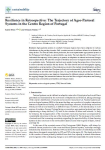Dinis I., Simões O. (2021). Resilience in retrospective: the trajectory of agro-pastoral systems in the centro region of Portugal. Sustainability, 01/05/2021, vol. 13, n. 9, p. 1-29.
https://doi.org/10.3390/su13095089
https://doi.org/10.3390/su13095089
| Titre : | Resilience in retrospective: the trajectory of agro-pastoral systems in the centro region of Portugal (2021) |
| Auteurs : | I. Dinis ; O. Simões |
| Type de document : | Article |
| Dans : | Sustainability (vol. 13, n. 9, May 2021) |
| Article en page(s) : | p. 1-29 |
| Langues : | Anglais |
| Langues du résumé : | Anglais |
| Catégories : |
Catégories principales 06 - AGRICULTURE. FORÊTS. PÊCHES ; 6.4 - Production Agricole. Système de ProductionThésaurus IAMM RESILIENCE ; SYSTEME AGROPASTORAL ; APPELLATION D'ORIGINE PROTEGEE ; FROMAGE ; APPROCHE PARTICIPATIVE ; REGION D'ALTITUDE ; FROMAGE DE BREBIS ; LAIT DE BREBIS ; EXPLOITATION LAITIERE ; ZONE RURALE ; COMMUNAUTE RURALE ; PORTUGAL ; CENTRO |
| Mots-clés: | SYSTÈME SOCIOECOLOGIQUE |
| Résumé : | Agro-pastoral systems in southern European regions have been subjected to various disturbances in the past few decades. Still, a certain amount of resilience allowed to withstand its sharp decline. The Serra da Estrela cheese production, the most representative agro-pastoral system of the Portuguese Centro Region, is a demonstrative case study. The main objective of this research is to understand the trajectory of this system up to present, its adaptation to internal and external changes and evolution trends. We used the concepts of resilience and socio–ecological system as framework in a qualitative study. Participatory methods were applied using the perspectives of local actors, in order to identify and analyze the key factors. The main drivers are socio-demographic (ageing, depopulation, social perception of the profession), economic (free market, industrialization), political (lack of adequate of national and European policies) and environmental (climate change, forest fires). Our results are in line with other European cases. To cope with these trends, the system is irreversibly transforming, moving into a new trajectory characterized by different systemic architecture. In face of the ongoing changes, the interactions between the social and the ecological subsystems are blurring, whereas local communities and traditions are being excluded. |
| Cote : | En ligne |
| URL / DOI : | https://doi.org/10.3390/su13095089 |







